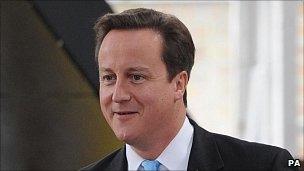Committee grilling likely to hold few fears for Cameron
- Published

David Cameron is to be asked questions on up to 20 different subjects
It should be political dynamite but, in truth, the liaison committee grillings of prime ministers have proved a bit of a political dud.
The two-and-a-half hour interrogation sessions by the most senior backbenchers in the Commons have tended to owe rather less to the Spanish Inquisition and rather more to the comfy sofa of daytime TV.
But how has this come about?
When Tony Blair first agreed to appear before the committee in 2002 it was seen as a great extension of prime ministerial accountability and a huge boost for the authority of Parliament.
Previously all occupants of No 10 had resolutely refused to appear before any select committee arguing that Prime Minister's questions (PMQs) was sufficient.
The hope was that in the less partisan environment of a select committee and away from the ya-boo of the Commons chamber it would be possible to glean some real and important information out of the prime minister.
Frankly that hasn't happened.
The main reason, I suspect, is that even though it is not PMQs, prime ministers know full well that we journalists are poised to seize on any admission, revelation or gaffe.
Well prepared
The consequence is that PMs tend to approach these hearings in ultra defensive mode and determined not to say anything remotely important.
Secondly, leaders are just hugely well practised at answering questions while giving nothing away.

Mr Blair used his charm to disarm MPs during his appearances before the committee
Tony Blair's favourite technique was just to charm his way past problematic questions.
Gordon Brown would simply bulldoze the questioner into submission with a heavy bombardment of impenetrable figures.
And then there's the problem of the committee itself. It's just too unwieldy. Too many committee chairmen trying to raise too many questions on too many different subjects.
Today's session has almost twenty different topics to be covered. By my maths that means little more than seven minutes on each area.
Any prime minister can easily waffle his way through to the bell.
There also tends to be a lack of coordination among the committee chairs. Too often they seem determined to have their moment in the spotlight regardless. The result is there is rarely any sustained line of questioning.
So could the liaison committee do better? Well here are a few thoughts.
Less deference
First, stop being so deferential. There is a reason that the John Humphrys and Jeremy Paxmans of this world interrupt and harry. It is to try and make sure the powerful do answer questions.
Second, how about just one or two subject areas? And go for detail. Prime ministers can talk big thoughts and generalisations until the cows come home. Detail is what they dread.
Third, park the egos and let your best interrogators do the questioning. Interviewing is actually much harder than it may look. So keep the questions direct and short. That way the PM has less time to think of an answer.
And finally, plan, prepare and plot in advance. Because rest assured, the prime minister will be more than ready.
Oh...and good luck.